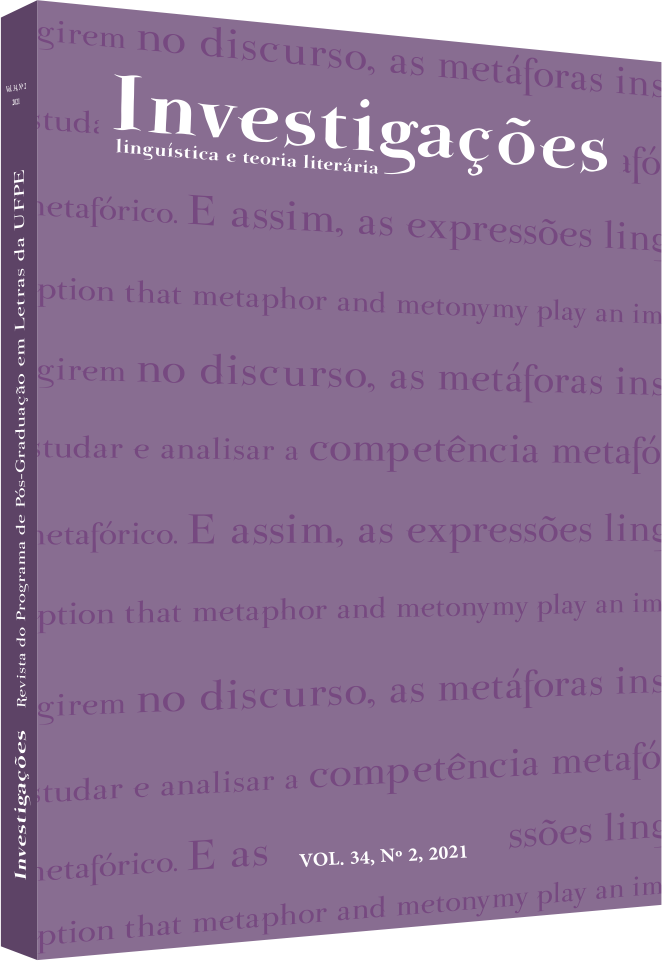Transmodalidade em/e processos de produção: mudando disposições e práticas
DOI:
https://doi.org/10.51359/2175-294x.2021.249198Keywords:
composition, transmodality, writing instruction.Abstract
In this work, Jody Shipka reflects on the multisemiotic nature of compositional practices based on a transmodal approach. The author calls attention to the need for changing dispositions and practice to embrace the complex diversity of processes, overlaps, dialogues, semiosis, agencies, and materialities involved in the meaning-making process. Moving beyond graphocentric practices, Shipka argues for the work with diversity as a resource for making and negotiating meanings, in order to expand students’ rhetorical awareness and develop their compositional fluency, allowing for the reflection about the variety of conventions, technologies, materialities and practices mobilized in the compositional process.References
BAWARSHI, Anis. Beyond the Genre Fixation: A Translingual Perspective on Genre. College English, v.78, n.3, p.243-49, 2016.
BENNETT, Jane. Vibrant Matter: A Political Ecology of Things. Durham: Duke University Press, 2010.
CANAGARAJAH, A. Suresh. Toward a Writing Pedagogy of Shuttling between Multilingual Writers. College English, v.68, n.6, p. 589-604, 2006.
CANAGARAJAH, A. Suresh. Translingual Writing and Teacher Development in Composition. College English, v. 78, n.3, p. 265-273, 2016.
CUSHMAN, Ellen. Translingual and Decolonial Approaches to Meaning Making. College English, v.78, n.3, p. 234-242, 2016.
FRAIBERG, Steven. Composition 2.0: Toward a Multilingual and Multimodal Framework. College Composition and Communication, v.62, n.1, p.100-126, 2010.
GUERRA, Juan C. Cultivating a Rhetorical Sensibility in the Translingual Writing Classroom. College English, v. 78, n.3, p. 228-233, 2016.
HIGHMORE, Ben. Ordinary Lives: Studies in the Everyday. London: Routledge, 2010.
HORNER, Bruce; LOCKRIDGE, Tim; SELFE, Cynthia L. Translinguality, Transmodality, and Difference: Exploring Dispositions and Change in Language and Learning. [Digital monograph]. Intermezzo/Enculturation, 2015.
HORNER, Bruce; LU, Min-Zhan; ROYSTER, Jacqueline Jones; TRIMBUR, John. Language Difference in Writing: Toward a Translingual Approach. College English, v. 73, n.3, p. 303-313, 2011.
HORNER, Bruce; SELFE, Cynthia. Translinguality/Transmodality Relations: Snapshots from a Dialogue. Working paper series. University of Louisville, 2013.
JORDAN, Jay. Material Translingual Ecologies. College English, IIA, 2015, p.360-378.
KRESS, Gunther. Before Writing: Rethinking the Paths to Literacy. New York: Routledge, 1997.
LATOUR, Bruno. Reassembling the Social: An Introduction to Actor-Network-Theory. Oxford: Oxford University Press, 2005.
LU, Min-Zhan; HORNER, Bruce. Translingual Literacy, Language Difference, and Matters of Agency. College English, v. 75, n.6, p. 582-607, 2013.
MICCICHE, Laura R. Writing Material. College English, v 76, n.6, p. 488-505, 2014.
PRIOR, Paul A.; HENGST, Julie A. (eds.). Exploring Semiotic Remediation as Discourse Practice. New York: Palgrave Macmillan, 2010.
PRIOR, Paul; SHIPKA, Jody. Chronotopic Lamination: Tracing the Contours of Literate Activity. In: BAZERMAN, Charles; RUSSELL, David (Eds.). Writing Selves, Writing Society: Research from Activity Perspectives. Fort Collins: WAC Clearinghouse, 2003.
SHIPKA, Jody. Toward a Composition Made Whole. Pittsburgh: University of Pittsburgh, 2011.
SIRE, Geoffrey. English Composition as a Happening. Logan: Utah State University Press, 2002.
SOHAN, Vanessa Kraemer. ‘But a quilt is more': Recontextualizing the Discourse(s) of the Gees Bend Quilts. College English, v. 77 A, p. 290-312, 2015.
Downloads
Published
How to Cite
Issue
Section
License
Copyright (c) 2021 Jody Shipka, Jailine Mayara Sousa de Farias

This work is licensed under a Creative Commons Attribution 4.0 International License.
Authors who publish with Revista Investigações agree to the following terms:
Authors retain copyright and grant the journal right of first publication with the work simultaneously licensed under the Creative Commons Attribution 4.0 International (CC BY 4.0) license that allows others to share the work with an acknowledgement of the work's authorship and initial publication in this journal.
Authors are able to enter into separate, additional contractual arrangements for the non-exclusive distribution of the journal's published version of the work (e.g., post it to an institutional repository or publish it in a book), with an acknowledgement of its initial publication in this journal.
You are free to:
Share — copy and redistribute the material in any medium or format for any purpose, even commercially.
Adapt — remix, transform, and build upon the material for any purpose, even commercially.
The licensor cannot revoke these freedoms as long as you follow the license terms.
Under the following terms:
Attribution — You must give appropriate credit , provide a link to the license, and indicate if changes were made . You may do so in any reasonable manner, but not in any way that suggests the licensor endorses you or your use.
No additional restrictions — You may not apply legal terms or technological measures that legally restrict others from doing anything the license permits.

